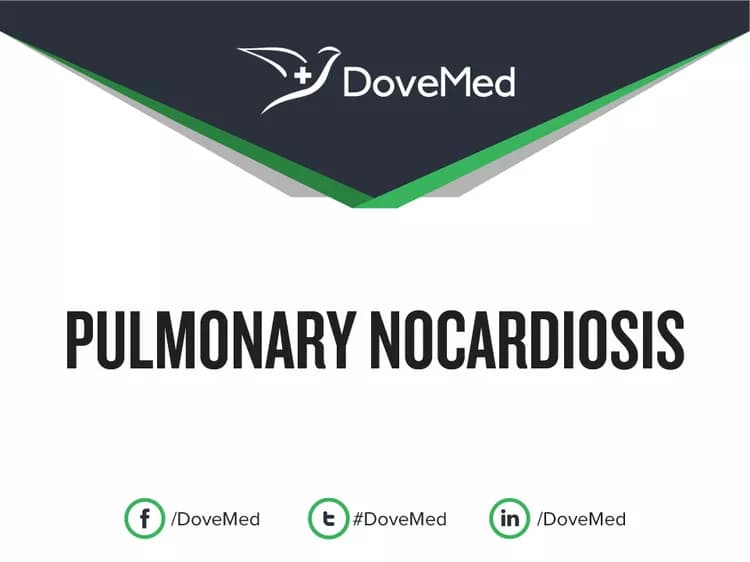What are the other Names for this Condition? (Also known as/Synonyms)
- Nocardial Infection of Lung
- Nocardiosis of Lung
What is Pulmonary Nocardiosis? (Definition/Background Information)
- Pulmonary Nocardiosis is a lung infection caused by the bacteria Nocardia asteroides. The infection is acquired by inhaling the bacteria
- Individuals with suppressed immune systems have a very high risk of being infected (opportunistic infection)
- The common signs and symptoms of Pulmonary Nocardiosis are cough (with blood and sputum), fever, general feeling of illness, and night sweats. The complications of this disease may include the formation of brain and skin abscesses
- Antibiotics are the mainstay of treatment for Pulmonary Nocardiosis. The prognosis is good with correct diagnosis and appropriate treatment
Who gets Pulmonary Nocardiosis? (Age and Sex Distribution)
- Pulmonary Nocardiosis can occur in individuals of any age group, but is most commonly observed in middle-aged individuals (mean age at diagnosis is 40 years)
- Males are more commonly affected by this lung infection than females
What are the Risk Factors for Pulmonary Nocardiosis? (Predisposing Factors)
There are multiple factors associated with Pulmonary Nocardiosis and these include the following:
- Individuals with weak immune system, such as those with HIV infection, taking steroid medications for a long time, or taking drugs that weaken the immune system such as cyclosporine after organ transplantation, etc.
- Individuals with chronic lung diseases such as emphysema or tuberculosis
- Chronic smokers
- Recent reports have suggested that certain unlicensed cosmetic procedures also increase the chances of contracting Nocardial Infection of Lung
It is important to note that having a risk factor does not mean that one will get the condition. A risk factor increases ones chances of getting a condition compared to an individual without the risk factors. Some risk factors are more important than others.
Also, not having a risk factor does not mean that an individual will not get the condition. It is always important to discuss the effect of risk factors with your healthcare provider.
What are the Causes of Pulmonary Nocardiosis? (Etiology)
- Pulmonary Nocardiosis is caused by inhalation of the bacteria Nocardia asteroids. The bacteria multiply in the lung tissue and causes pneumonia-like symptoms
- The bacteria can also spread to the rest of body and damage other tissues and organs
What are the Signs and Symptoms of Pulmonary Nocardiosis?
Pulmonary Nocardiosis generally presents with pneumonia-like symptoms, which include the following:
- Fever
- Fatigue
- Night sweats
- Shortness of breath
- Chest pain
- Cough, which may contain blood
How is Pulmonary Nocardiosis Diagnosed?
The diagnosis of Pulmonary Nocardiosis may involve:
- Complete evaluation of medical history along with a thorough physical exam
- Blood tests that include a complete blood count (CBC), which gives a picture of infection in the body
- Chest x-ray: It gives an image of the lungs and is helpful in identifying the focus of infection or abnormality in the lung
- CT scan of the chest: This imaging tool helps present detailed pictures of the lungs and is helpful to determine the extent of the disease
- Sputum microscopy and culture: Staining the phlegm with special staining techniques and observing them under microscope can help identify the disease. Also, growing the microorganisms under special conditions in the laboratory can help identify them, as they have a typical appearance and characteristics
- Bronchoscopy and broncho-alveolar lavage: During this procedure, a long tube is passed through the windpipe into the lungs to directly observe the insides of the lungs. The physician can also take bronchial washings and tissue for microbiological and pathological tests. This procedure is done under anesthesia
- Pleural fluid microscopy and culture: The pleural fluid is removed and taken out for microscopic examination and culture to identify the causative organism
Many clinical conditions may have similar signs and symptoms. Your healthcare provider may perform additional tests to rule out other clinical conditions to arrive at a definitive diagnosis.
What are the possible Complications of Pulmonary Nocardiosis?
Pulmonary Nocardiosis can spread to other parts of the body and produce symptoms according to the organs involved.
- Pleural effusion: It is the accumulation of fluid in the space present between the lungs and the chest wall
- Hepatosplenomegaly: When the liver and spleen are involved, it causes swelling of the liver and spleen
- Nervous system involvement: It can cause brain abscess and meningitis manifesting as headache, dizziness, confusion, and seizures
- Skin infection leading to skin abscesses
How is Pulmonary Nocardiosis Treated?
The treatment of Pulmonary Nocardiosis may include:
- Primarily, antibiotics are used in the treatment of the condition. Pulmonary Nocardiosis requires treatment for 3-6 months preferably with co-trimoxazole
- Patients, who do not respond to the above treatment, are usually treated with ampicillin, erythromycin, or minocycline
- Surgery might be required to remove or drain the abscesses
How can Pulmonary Nocardiosis be Prevented?
Preventive measures for Pulmonary Nocardiosis include:
- Drugs, such as corticosteroids should be used cautiously, at a minimum dose and for a minimum possible period of time
- Individuals with weak immune systems may require antibiotics to prevent this disease
What is the Prognosis of Pulmonary Nocardiosis? (Outcomes/Resolutions)
- The prognosis of Pulmonary Nocardiosis is good, if the infection is limited to the lungs
- In cases where the disease spreads to other organs or there is a severe underlying lung disease, the outcome may be poor
Additional and Relevant Useful Information for Pulmonary Nocardiosis:
- The sputum culture test is a routine test to detect bacterial infection of the lower respiratory tract. It is used to diagnose lower respiratory tract infection and to determine the appropriate antibiotic treatment
The following article link will help you understand sputum culture test:
http://www.dovemed.com/common-procedures/procedures-laboratory/sputum-culture-test/
Related Articles
Test Your Knowledge
Asked by users
Related Centers
Related Specialties
Related Physicians
Related Procedures
Related Resources
Join DoveHubs
and connect with fellow professionals


0 Comments
Please log in to post a comment.